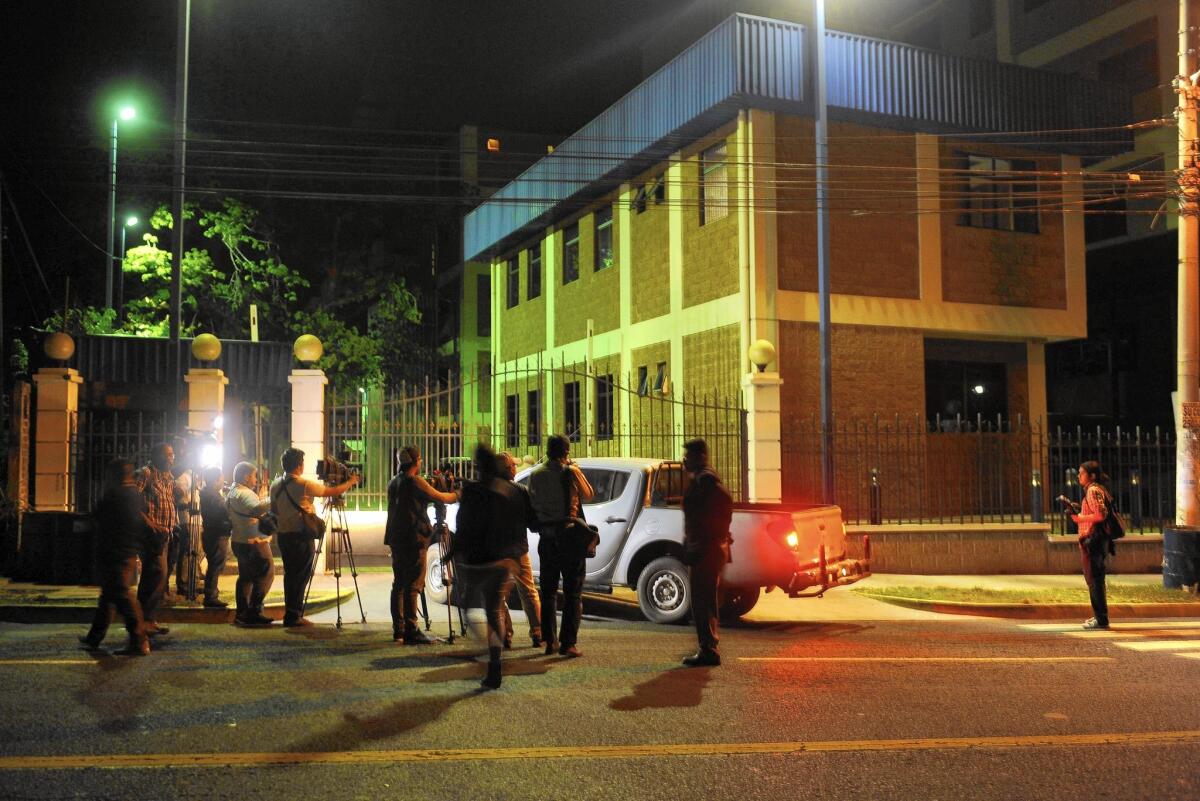Will arrests bring ‘real progress’ in fight against impunity in El Salvador?

reporting from SAN SALVADOR — The wheels of justice have turned slowly since the execution-style killings of six Jesuit priests by El Salvador’s armed forces in 1989, an event that shocked the world, brought sharp cuts in U.S. military aid to the strife-torn nation and indirectly facilitated the peace agreement the martyrs had sought.
El Salvador had been in the midst of a civil war that pitted leftist guerrillas against the U.S.-backed, right-wing government, which had gained infamy for its use of death squads and torture. The war lasted 12 years, left 75,000 dead and opened floodgates of refugees fleeing to the United States, many to Southern California.
But few events in that time were more notorious than the shooting deaths of the priests.
A measure of justice finally arrived last week when El Salvadoran authorities arrested four former army soldiers accused of carrying out the killings, years after an extradition request from Spain, where five of the six priests were from.
NEWSLETTER: Get the day’s top headlines from Times Editor Davan Maharaj >>
“This should lead to real progress toward the end of impunity,” said Almudena Bernabeu, a human rights attorney with the San Francisco-based Center for Justice and Accountability. “There are 18 people implicated in the murders and I’d like to see more arrests. But it’s a start.”
Bernabeu has pursued the case for the family of one the victims, Father Ignacio Martin-Baro. She said she won’t rest until all those she believes responsible for the deaths, including former El Salvadoran President Alfredo Cristiani and several of his ministers, are brought to justice.
Bogged down for many years, the case was given added impetus last month when U.S. Magistrate Kimberly Swank in North Carolina ordered the arrest of a Salvadoran army colonel living in her state who is a suspect in the case. His extradition to Spain is pending U.S. State Department approval.
“Justice has taken so long because there often is a lack of accountability in the countries where the wars took place,” Bernabeu said, referring to Central American conflicts in El Salvador, Nicaragua and Guatemala, among other places. The alleged perpetrators “are protected by their images as recycled businessmen and respectable citizens and by the fear people have of going after them.”
Retired army Col. Carlos Rivas, who is now an independent analyst of the “culture of impunity” in El Salvador, said an amnesty law passed the year after a peace accord was signed in 1992 has impeded investigations and protected politicians and military leaders.
“It has allowed many criminals of the right and left wings to mutate into organized crime and drug trafficking in the postwar” era, Rivas said.
On the morning of Nov. 16, 1989, the six priests, a housekeeper and her daughter were rousted from a university dormitory in San Salvador and gunned down with automatic weapons by members of an army battalion.
Bernabeu said there is evidence that Cristiani, his defense minister, the commander of the leading military academy and several top armed forces commanders planned the killings. Their objective, she said, was to sow fear among human rights activists in a civil war in which the government was losing ground.
But the killings instead galvanized opponents of U.S. military aid then being funneled to the Cristiani government. After pressure was applied by the U.N., the U.S. and Mexico, the two sides worked out the so-called Chapultepec Peace Accords of 1992.
The priests’ deaths were among many atrocities in the civil war.
See more of our top stories on Facebook >>
In 1980, an assassin killed Archbishop Oscar Romero, who has since been canonized by the Roman Catholic Church. Later that year, four American churchwomen were slain at a military checkpoint.
A U.S. investigation carried out by embassy officials in El Salvador after the host government proved unwilling or unable to look into the deaths found that the women were killed by Salvadoran security forces.
Many maintain that the war’s brutal aftermath persists in the hyper-violent gangs such as the Mara Salvatrucha and M-18, both of which have affiliates in Los Angeles. The mayhem of the gangs, many of whose members are former combatants, has made their country one of the world’s most violent.
Whether the four suspects arrested Friday night ultimately will be extradited to face trials in Spain remains an open question. Rivas, for one, is skeptical because the amnesty law is still in effect. Moreover, too many prominent figures could be compromised in such trials.
“Political and economic deals have been made,” Rivas said. “Rather than a blow against impunity, on the contrary the current situation only favors the interests of those hoping that the investigation continues as it has, without the political will to see it through.”
Special correspondents Kraul and Renderos reported from Bogota, Colombia, and San Salvador, respectively.
ALSO
After recent ICE raids, sanctuary movement grows for immigrant here illegally
City Atty. Mike Feuer, turf rebate recipient, steers clear of DWP records lawsuit
Fighting mosquitoes with mosquitoes: Biological weapons target Zika virus
More to Read
Sign up for Essential California
The most important California stories and recommendations in your inbox every morning.
You may occasionally receive promotional content from the Los Angeles Times.









